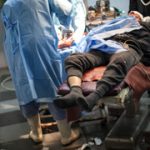It hurts me that my country needs doctors and I left.
I was completing my medical residency at a public hospital when anti-government protests first broke out in Syria. By the end of 2011, government security forces were bringing detained members of the opposition to my hospital for treatment. Members of the security forces would insult and physically attack the medical staff, while also causing chaos by shooting their weapons into the air. In one instance, my colleagues and I were unable to save a severely injured member of the security forces. The soldiers that brought him in threatened that if I was unable to save the man, they would take my life. One of them pointed a machinegun at us and told us to shock the dead man with electricity.
Although I knew that the patient was already dead, I had no choice but to play along and pretend to treat him by using the defibrillator, as requested, and giving him an injection – I knew that if I did not comply, our lives would be in danger. Another security official was more understanding, and eventually convinced the others to let go of the situation. Someone from the hospital’s morgue later told me that the deceased guard had two grenades in his pockets. If we had used a higher level of electricity to shock him, it is likely that the grenades would have detonated, injuring, if not killing, us all.
I saw many detainees in my hospital who appeared to have suffered abuse. One female detainee was brought in to see an obstetrician to get a pregnancy test, and the doctor identified signs of torture on her body; she may have also been raped. I treated another patient with multiple fractures and whose leg and face were swollen from beatings; one of his eyes was bruised to the point that he was unable to open it. Another detainee came in with a high fever, had been repeatedly beaten in the head until he lost consciousness, and was having seizures in the emergency room. I insisted to the security forces that they should leave him at the hospital for treatment, but they refused and took him back to detention – undoubtedly to torture him further – after some superficial treatment.
I distinctly remember an occasion when security forces arrived at the hospital and aggressively forced all the doctors to gather and treat an injured officer. I saw them push one of my colleagues down the stairs and beat him. I only managed to escape by changing out of my scrubs and pretending to be a patient.
Likely because I am a doctor and I treated people on all sides of the conflict, I was on a government wanted list. When my town was attacked by security forces, soldiers came to my house, arrested me, and destroyed my home. They took me to detention, where one of the guards told me, “Just because you are a doctor, don’t think we will treat you with respect.” I was beaten during the interrogation and asked: “Why did you treat the wounded – how many? We need names and locations of the wounded.” I denied treating protesters and convinced the guards that although I was involved in demonstrations, I did not treat any of the demonstrators. The abuse continued throughout my detention – and the guards often mentioned my status as a doctor and tried to force me to tell them how many injured demonstrators I had treated.
At one point, a guard – who had previously beaten me – came to my cell seeking medical consultation. I did my ethical duty and provided him with the medical advice he needed. Even though he insulted me, I felt that he is still weak as a human and that I could defeat him with my ethical values.
I know that I was detained in part because I am a doctor. An interrogator threatened to take away my medical license if I did not confess to taking part in protests and treating injured demonstrators; they also demanded my cooperation in providing information on patients in the future. I didn’t concede to the conditions of that ultimatum, but I was forced to sign a blank piece of paper – likely to be used for a false confession. Eventually, I was taken to court and released after about eight days of detention and abuse.
I believe that the reason Syrian security forces deliberately attacked medical personnel at the beginning of the conflict was in order to prevent protesters from receiving medical care. Many of my medical colleagues were, like me, targeted and intimidated in an attempt to obtain the names of demonstrators. Moreover, meddling by security forces deterred injured demonstrators from seeking medical treatment at hospitals. Protesters recognized early on that security forces were collecting names at hospitals and would target those who had been injured while participating in protests.
There is now a terrible rift between people who have stayed in Syria and doctors who have fled. While the opposition was grateful to those doctors who upheld doctor-patient confidentiality and withheld patient names from security officials, I know they were also upset with doctors who left Syria. Some members of the opposition made general threats about what they might do to the doctors who may later return. As one of the doctors who eventually fled, I have a lot of guilt and can’t help feeling that I have abandoned my people and my colleagues. I am a doctor. They need me. It hurts me that my country needs doctors and I left.
While at one time I dreamt of a modern and democratic Syria, now my greatest hope is simply that we may see an end to the injustice of people being tortured and killed in my country.
*The author’s name has been changed for security purposes.

